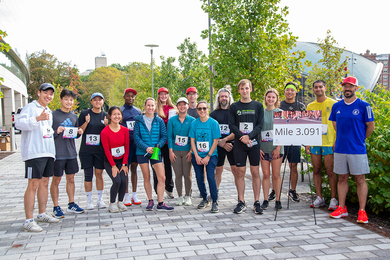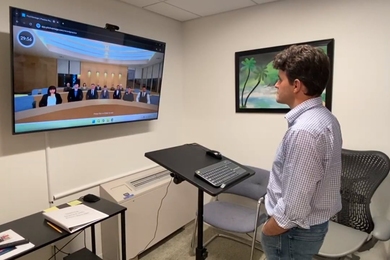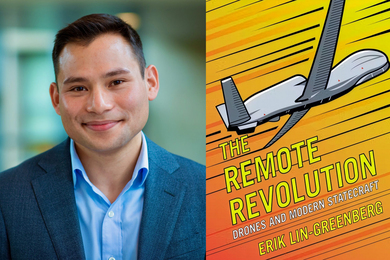The MIT faculty has approved a proposal to develop, "in partnership with the Department of Defense," an on-campus ROTC program that, by being open to all students including those not eligible for DOD scholarships or commissions, would be "more inclusive and better aligned with the values and mission of MIT."
The resolution also calls for MIT to provide students who lose ROTC scholarships because of sexual orientation with an equivalent financial aid package, provided they commit to some form of public service.
President Charles M. Vest, who presided at the meeting, said the faculty had "taken a creative and, I hope, ultimately productive action." Current DOD policy and federal law are at odds with MIT's nondiscrimination policy.
The resolution calls for President Vest and the chair of the faculty, Professor Lawrence S. Bacow, to appoint a committee with a mission of promoting change that would "eliminate discrimination against homosexuals in the military."
About 80 faculty members were present and approved the proposal on a voice vote. There was one "no" vote and three abstentions.
The modified ROTC program would be open to all qualified MIT students, without discrimination or differential treatment. The proposal as adopted includes the report of the Task Force, which speaks of the value of ROTC to MIT students and which anticipates that "tangible progress will be made in achieving the modified ROTC program" within two years. If movement toward an inclusive and nondiscriminatory program cannot be discerned at that time, the faculty will consider possible further action.
An additional change in the proposed motion occurred at the outset of the discussion when Professor David Thorburn of literature sought more explicit language in place of the reference to bringing about change in the DOD policy and the law. Change isn't always positive, he pointed out.
Professor Thorburn also said he was uneasy with what he called a "self-congratulatory sense" that he noted as "emerging from our discourse among ourselves" in both faculty meeting discussions and in the recent Faculty Newsletter-a sense that "we're being very civil and isn't it good that we're so collegial." Nevertheless, he said, "we're not being explicit about the really horrific fact that the policies on homosexuality in the military are the last frontier in American culture where there is an institutionalized form of homophobia. We shouldn't be ambiguous about wanting to eliminate that. I'd be much more comfortable if we were more explicit on these matters."
Professor William B. Watson of history, a member of the Task Force, said he regarded the change being proposed as a "friendly amendment" and suggested language that change was sought "in order to eliminate discrimination against homosexuals in the military." Professor Thorburn agreed with that language and it was unanimously accepted by the meeting.
Professor Ralph N. Wedgwood of linguistics and philosophy praised the Task Force for its "truly Herculean labors" over the past month as members listened "to the various misgivings that I and other members of the MIT community have expressed about the original version of their proposals. "
However, he said he would abstain from voting rather than voting "no" because a negative vote might "create divisiveness." He would not vote in favor, he said, because "this isn't the best course for us to take" and, for the sake of the record, he thought it best that the proposal receive a "muted rather than ringing endorsement from this faculty." He said the proposal overestimated the degree to which a modified program would help those who suffer from discrimination. "MIT is just as likely to help to change policy if it takes a stern and uncompromising line against discrimination. Perhaps bold, drastic action is just as likely to work as soft-shoe lobbying. Who knows?"
Professor Wedgwood said MIT "should condemn discrimination in the same spirit as that in which we condemn plagiarism or the falsification of experimental data or the abridgment of academic freedom. The proposal is seen by a majority of MIT's gay community as clear evidence that MIT is willing to play fast and loose with its commitment to nondiscrimination."THE NEXT STEP?
Professor Samuel J. Keyser of linguistics and philosophy said that five years ago, when he was MIT's representative seeking a change in the DOD policy, it was his impression that Congress was "the real problem." He urged that the committee that will be named to work for change also consider "what our next step is going to be." Professor J. Kim Vandiver, a member of the Task Force, said he felt it was impossible to "predict where we will be two years from now." Graduate student Frank P. Tipton, also a Task Force member, said there are "certain minimal standards" for any program on campus and the Task Force proposal was an effort "to have ROTC meet those minimal standards." His suggestion to the faculty two years from now, he said, would be that if ROTC doesn't meet those standards, it "doesn't have a place on this campus."
Professor Henry Jenkins of literature said he didn't think the DOD would go along with the idea of a modified program, although he'd like to be proven wrong, but to vote against the proposal "would be to sacrifice some very real victories for gay and lesbian students in this report..." Abstaining, he said, "would be to leave oneself outside of the process rather than central to it." Having made that compromise, he said, he posed two challenges.
"For every person who suggested to me that I should compromise and be moderate on this issue in the hope of bringing about a better solution, of working through the system, of going the last mile, I hope each of them will be with us two years from now, if this does fail, in voting for more drastic and dramatic solutions. I hope that many of you who've held back in supporting that stance at this point will reconsider, as much as I've struggled to reconsider this question over the last month or two."
His other challenge, he said, was to "shift our focus" from ROTC students at MIT to gay and lesbian students at MIT. "We should also be focusing on gay and lesbian studies at MIT. If the argument in favor of maintaining ROTC is a commitment to education, we should be equally committed to the education of gay and lesbian students in the areas of vital importance to them and their personal development and sense of security here at MIT."
Professor James L. Kirtley Jr. of electrical engineering and computer science asked if the Task Force had estimated the cost of reinsuring students who lose ROTC scholarships. Professor Graves said there was no way to make such an estimate other than to note that since 1990 no student had been disenrolled.
Professor Michael J. Piore of economics said he favored the proposal because it "faces up to the fact" that MIT "is stuck" with the issue of don't-ask-don't-tell and seeks "to create a mechanism" for dealing with it. But don't-ask-don't tell is not confined to ROTC, he said. "It is pervasive on this campus, although it is a de jure part of ROTC and the military."
He also said that the issue of free speech has been "underestimated in the discussion. you can't do what this proposal asks MIT to do with respect to ROTC without monitoring speech in that program." He also noted "that this set of issues is intimately involved with the issue of gay studies. at MIT."
Professor Piore praised the Task Force and the community for the "impressive" way the issues have been explored, "but I really don't think there is room for complacency at MIT about the way this issue has been treated. Because as I look around the room, while this is a very well-attended faculty meeting, it is a very, very small portion of the faculty, and. the vast majority of the faculty have ignored this discussion about ROTC. And while they have ignored this discussion, I have had several discussions with faculty members about the issue of political correctness and free speech at universities around the country and also about the issue of cultural studies, gay studies, black studies, women's studies and their legitimacy in an academic community. I believe that if it came down to the final wire and all the people who listened to this discussion were here two years from now and had to deal with the question of what to do about ROTC next, that we would come out in a way that was really responsive to the issues. But what I worry about is. that the reaction of people who have failed to participate in the debate will in the end lead MIT to abandon the commitments which it's making in this resolution."
President Vest, who in concluding the meeting praised the ROTC Task Force for "a truly extraordinary job," said he has drawn strength in his discussions in Washington on the ROTC matter from two things. One has been "the ability to look people in the eye and say unequivocally that I believe the existing policy, now law, is wrong, and should be changed and will change. The other is being able to say that the faculty is behind the changes that we are asking for.
"I remain an optimist. I do believe that this policy, this law, this approach of the nation is going to change-I don't whether it's going to be tomorrow, I don't know whether it's going to be next year. but it will change. We have friends on this issue in the White House, in the Department of Defense and in Congress. They have not carried the day so far, but eventually it's going to happen. It most likely will happen by act of the courts. I think that being present, being part of the discussion, being engaged, is going to do more to help than to have taken the opposite tack."
President Vest noted that "there is lots of historical evidence" that the record of the military "has been extremely strong" in implementing social changes, once those changes become policy or the law of the land, "despite the fact that it [the military] is often one of the last parts of the nation to change."
Affecting change won't "be an easy matter, but I think that our standing, our ability to promote change in the department is going to be strengthened by this concept of engagement. Those who have moved to a sort of arms-length arrangement or those who have totally cut ties have lost a voice and the ability to work together to promote change."





